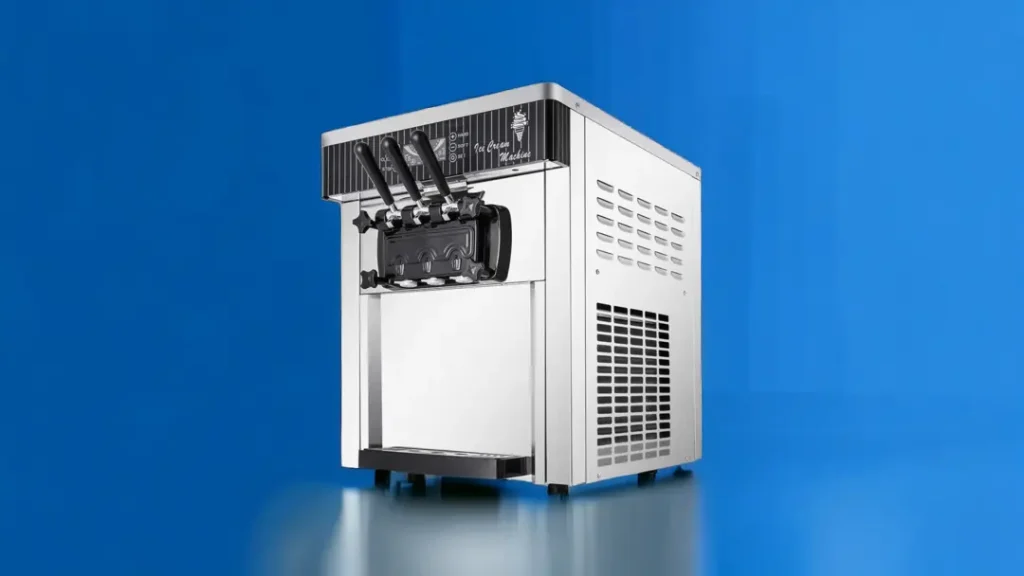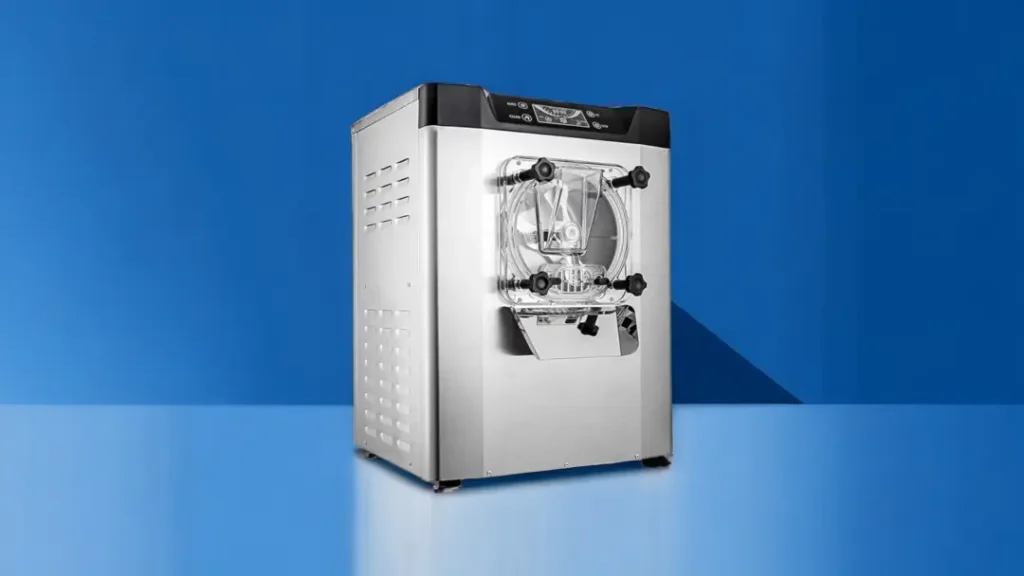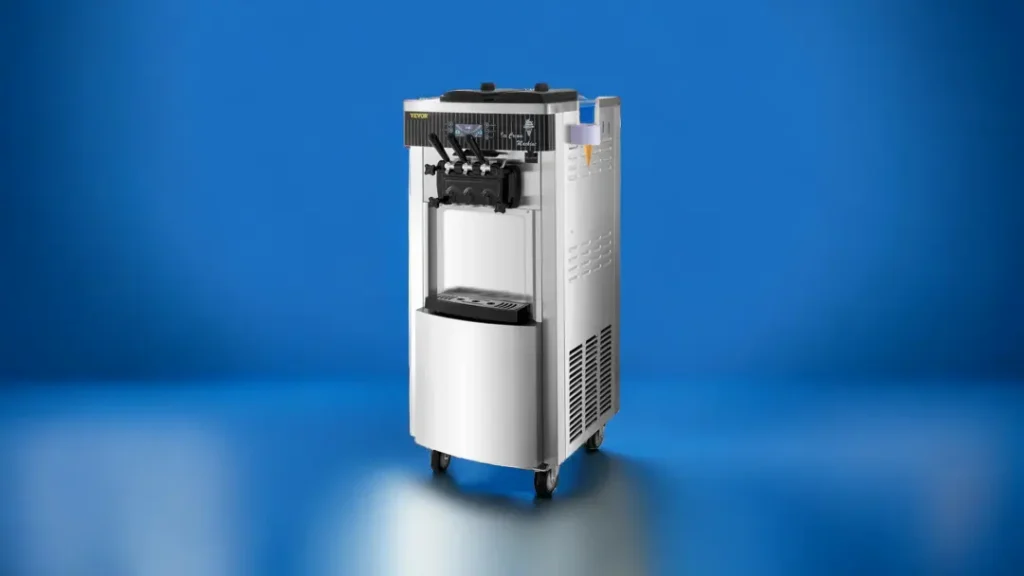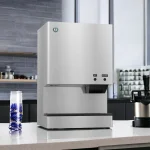A commercial ice cream maker is a specialized piece of equipment designed for producing large quantities of ice cream in a commercial setting, such as ice cream shops, restaurants, or catering businesses. These machines typically have a higher capacity than home ice cream makers and are built to withstand frequent use. Countertop models and larger floor-standing units are available in various sizes and configurations. Commercial ice cream makers often feature potent motors, stainless steel construction for durability, easy cleaning, and advanced freezing technology to ensure consistent texture and flavour. They may also include additional features such as timers, digital controls, and automatic shut-off functions to streamline the ice cream-making process and maintain quality standards.

VEVOR Commercial Ice Cream Machine 5.3 to 7.4Gal per Hour Soft Serve with LED Display
Understanding Commercial Ice Cream Maker
Hence, a commercial ice cream maker is basically a specialized machine for efficient and regular churning and freezing of ice cream mixtures. Commercial ice cream makers are usually built to withstand the intense demands of high-volume production environments in ice cream parlours, restaurants, and cafés. In general, commercial ice cream makers are made to work in rough and tough conditions of high output.
Types of Commercial Ice Cream Makers:
Commercial ice cream makers come in multiple designs and sizes, made during different means of production needs and wants several major varieties of commercial ice cream makers: batch freezers and continuous freezers.
1. Batch Freezers:
Batch freezers are best suited for small and medium-scale production. These machines freeze the ice cream mixture in a batch, as a result of which the texture is smooth and creamy.
Batch freezers traditionally consist of a freezing chamber, a dasher or a mixing blade, and a refrigeration system. The mix is poured into the freezing chamber, where it is continuously mixed and frozen at the same time. After the desired ribboning or flow is reached, usually a soft serve, the ice cream is withdrawn and put in a separate hardening storage freezer.
2. Continuous Freezers:
Continuous freezers, on the other hand, have largely been done for large production and, in fact, are the common types in commercial factories and industries. Ice-cream production is continuous; therefore, there is a continuous flow out.
Continuous freezers work with a continuous process of freezing. Agitation and freezing take place simultaneously, with the ice cream mix being moved through the freezing cylinder by a pump. As the residence time is provided for the mix to pass by the freezing cylinder, ice cream is formulated and expressed continuously.

VEVOR Commercial Ice Cream Machine 1400W 20/5.3 Gph Hard Serve Ice Cream Maker with LED Display Screen
Benefits of Using a Commercial Ice Cream Maker:
This can only promise good things for business, considering all the benefits investing in a commercial ice cream maker has. Here they are:
1. Increased Production Capacity:
Commercial ice cream makers are geared towards breeding the maximum output in ice cream production so that businesses can make the best products available without compromising on quality or consistency.
2. Versatility in Menu Offerings:
A commercial ice cream machine opens a whole new experimentation with flavors, textures, and recipes by businesses that aim to diversify in the process, hence meeting the numerous preferences and dietary restrictions that their consumers have.
3. Enhanced Efficiency and Consistency:
Unlike the manual methods of ice cream production, commercial ice cream makers automate the freezing and churning process; thus, it leads to consistent results. This, in a way, saves the labor and time previously wasted on such.
4. Cost Savings in the Long Run:
Although the upfront cost of a commercial maker is high, the savings in the long run are also large. When ice cream is produced at the business premises, overhead costs that would have been incurred through purchasing or outsourcing the final product are reduced.

VEVOR Commercial Soft Ice Cream Machine, 3 Flavors Ice Cream Maker, 5.3 to 7.4 Gallons per Hour Auto Clean LCD Panel for Restaurants
Maintenance and Care:
Right maintenance and care is provided so that one can achieve maximum life span and performance from a commercial ice cream maker. Maintaining your machine is as simple as following these tips:
1. Regular Cleaning:
Clean the chamber, mixing blade, and any other part of the ice cream maker using soap and water thoroughly after every use to eliminate residues and the eventual growth of bacteria. Use cleaning agents that are not harmful to food and follow the manufacturer’s instructions to get the best results.
2. Lubrication:
Lubricate moving parts of the ice cream maker regularly, such as bearings and gears, so that smooth performance is conserved and premature wear is minimized.
3. Inspection and Repairs:
Periodic inspection for any sign of damage or malfunction, such as leaks, uncommon noises, or erratic performance, can definitely minimize the occurrence of critical repairs and downtime.
4. Calibration:
Periodically confirm ice cream maker temperature and speed settings so that the settings reflect the performance and consistency it was designed to deliver. Manufacturer’s calibration instructions available upon request.
Conclusion:
Commercial ice cream makers are a must when it comes to drawing in products of high-quality needed in commercial applications. Be it a small artisan outlet or a large-scale production unit; having the perfect ice cream maker will make a difference in the effectiveness and consistency of work, giving the best operation and value for money. Therefore, businesses can fully exploit the potential of commercial ice cream makers and continue wowing their customers with savory frozen delights.
FAQs for Commercial Ice Cream Maker
Q: What are some key points to consider before buying commercial ice cream makers?
A: In buying a commercial ice cream maker, consider the following: capacity, production speed, ease of use, ease of cleaning, durability, and whether the machine is a built-in refrigeration model or a pre-frozen bowl.
Q: How much ice cream can a commercial ice cream maker produce in an hour?
A: Production capacity highly varies from model to model. Some commercial ice cream makers produce 1-2 gallons of it in an hour, while in a high capacity model, it can be of 10 gallons, and even subsequently more.
Q: What kind of maintenance will a commercial ice cream maker require?
A: Regular maintenance includes cleaning the machine after every use, monitoring any wear and tear on its parts, and replacing them when necessary. Other aspects include lubrication of moving parts, which is necessary from time to time, and the state of the machine’s refrigeration system. Always refer to the manufacturer’s maintenance guidelines.
Q: Can I make other types of frozen dessert with a commercial ice cream maker?
A: Yes, many commercial ice cream makers are quite versatile and can be used to make other frozen desserts, such as gelato, sorbet, frozen yogurt, and soft-serve ice cream. Please check the specification of the machine and see the range of deserts it can prepare.
Q: What is the typical voltage requirement of a commercial ice cream machine?
A: Most commercial ice cream machines work off a standard electric outlet with either 110-120V or 220-240V, depending on the model and the region. Just make sure that the power supply is in accordance with the specifications given by the manufacturer in the case of any deviation.



